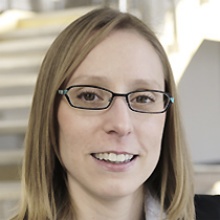Amy J. Karlsson
Associate Professor
University of Maryland
Chemical and Biomolecular Engineering
Engineering peptides for interactions with cells
Abstract
Protein engineering offers powerful approaches to designing proteins and peptides as molecular tools for biological applications. Our lab uses engineered proteins and peptides to study biological systems and design improved therapeutics and diagnostics. One focus of our work is engineering peptides for improved interactions with Candida fungal pathogens. C. albicans and other Candida species are human commensal organisms but can cause disease when patients are immunocompromised. Increasing drug resistance and the limited number of available antifungal agents necessitate the search for new therapeutic strategies. To address current therapeutic challenges, we are improving the properties of the human salivary peptide histatin 5, which has antifungal activity against C. albicans. Although histatin 5 has promise as a therapeutic agent, the fungus produces secreted aspartic proteases that degrade the peptide and reduce its antifungal activity. Our analogs of histatin 5 offer strong resistance to the fungal proteases without reducing antifungal activity. We are investigating the use of these analogs for treating and preventing disease, while also improving our understanding of how the secreted aspartic proteases recognize and cleave peptide substrates. In addition to exploring peptides as potential therapeutics, we are also using peptides to target and deliver bioactive molecules. We are examining how the properties of these cell-penetrating peptides affect their translocation across the cell wall and cell membrane of Candida cells and are defining the types of cargo that can be delivered into cells. By applying protein engineering strategies to designing peptides for targeted interactions with fungal cells, we are gaining information on structure-function relationships that will enable more efficient design of biomolecules for specific interactions with a variety of biological systems.
Bio
Dr. Amy J. Karlsson received her bachelor’s degree in chemical engineering from Iowa State University in 2003 and her Ph.D. in chemical engineering from the University of Wisconsin in 2009. Following her doctoral work, she was an NIH Ruth L. Kirschstein Postdoctoral Fellow at Cornell University. Dr. Karlsson joined the faculty of the Department of Chemical and Biomolecular Engineering at the University of Maryland in 2012, where her research group’s work lies at the interface of biology and engineering. Her group uses protein engineering strategies to improve the understanding of human diseases and cellular, especially the interaction of proteins and peptides with cells and cellular membranes. Dr. Karlsson is also active in engineering education research, with a current focus on improving education in chemical engineering laboratory courses.
Wednesday
April 17, 2024

Amy J. Karlsson
Associate Professor
Chemical & Biomolecular Engineering
University of Maryland
- Time: 11:00 AM
- Location: 206 Furnas Hall